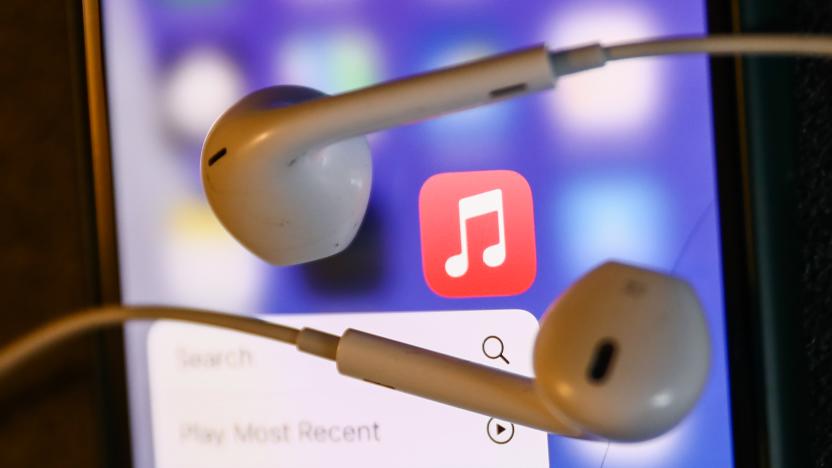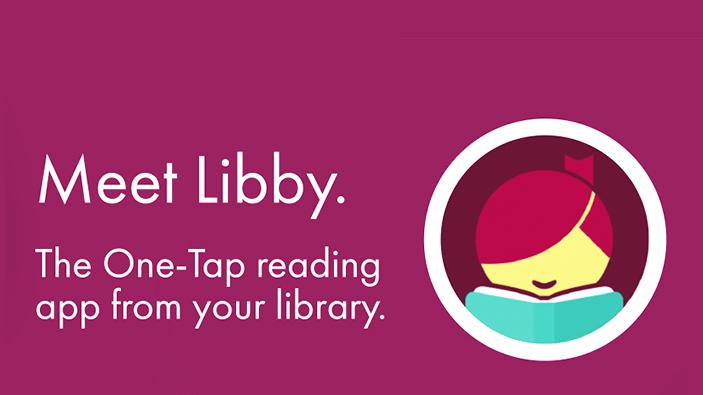libraries
Latest

Apple Music bug on iOS is reportedly mixing up people's playlists
Apple Music users on iOS are reporting a fairly serious bug that is causing other people's playlists and songs to appear in their libraries.

My to-read list exploded thanks to free books through the Libby app
Kris Naudus describes how the Libby library app helped restore her sanity during lockdown.

Alphabet partners with local library to deliver books to students
Students in a Virginia county can order books online and have them dropped off via one of Wing's drones.

Sonos can now stream free audiobooks from your local library
Sonos users can now borrow and stream audiobooks from their local libraries thanks to the free Libby app.

Pokémon manga e-books are available in schools and libraries worldwide
Pokémon manga e-books are now available to public libraries and schools worldwide through OverDrive, Inc. Students and library patrons can visit overdrive.com to find a participating library. From there, you'll be able to download Pokémon magna titles published by Viz Media, either on a web browser or via the Libby or Sora apps. Borrowed titles will expire at the end of the lending period, so as an added perk, there are no late fees.

Marvel comics arrive in Hoopla's public library app
Comic books are a brilliant medium, but keeping up with the latest releases can be expensive. If you live in the US, it's worth checking out Hoopla; the service is supported by more than 1,500 public libraries, and offers free digital access to DC, Image and IDW titles. And starting today, another major publisher is joining the platform: Marvel. More than 250 collections and graphic novels will be available, including Black Panther: A Nation Under Our Feet book one — by author, journalist and comic book writer Ta-Nehisi Paul Coates — Civil War and X-Men: The Dark Pheonix Saga.

Your next trip to the library could include an Oculus Rift
Public libraries aren't just for books anymore. These days, you can grab an e-book, movie or video game (not to mention learn how to code) at your local branch with nothing more than a free library card. Libraries are also the last bastion of internet access for those who can't afford it on their own, making the library an essential democratic tool. Oculus, the Facebook-owned virtual reality company, is taking it upon themselves to enhance public libraries with its own educational initiative that will place 100 VR head-mounted displays in 90 California libraries.

US government wants $1.5 billion more per year to get schools online
The FCC isn't depending solely on help from tech companies to get more libraries and schools connected to the internet. According to the New York Times, agency chairman Tom Wheeler will propose that the FCC should have up to $1.5 billion more to spend per year on internet access for education, giving it an annual budget of $3.9 billion. That's a hefty 62 percent increase, but officials reportedly believe that the upgrade is necessary given that many schools don't have data fast enough for modern learning. Over 40 million students don't have quick broadband, and existing offerings sometimes can't cope with the sheer demand from kids.

EU court rules libraries can digitize books without permission
The Court of Justice of the European Union (CJEU) has ruled that libraries have the right to digitize books and distribute them to dedicated reading terminals without first obtaining the publisher's permission. The decision rests on exceptions built into the EU Copyright Directive for reproducing and communicating intellectual property. Specifically it says that publicly accessible libraries may make works available at "dedicated terminals... for the purpose of research or private study." German publisher Eugen Ulmer, which filed the suit in question against the Technical University of Darmstadt, can't be happy with the result. But, the court didn't hand libraries a blank check to freely pass around digitized content either. The law still prevents these digitized copies from being stored on USB keys or printed out. Under the Copyright Directive, the act of printing or storing the files would mean the individual, not the library, was making the copy -- which would violate the law.

University of Michigan's Computer and Video Game Archive houses over 3,000 different games, roughly 35 unique consoles (video)
Systems such as the ColecoVision, TurboGrafx-16 and 3DO may have been ousted from most home entertainment centers long ago, but they still have shelf space at the University of Michigan's Computer and Video Game Archive. Slashdot caught up with Engineering Librarian and Video Game Archivist Dave Carter and took a look inside the repository, which has curated around 35 classic and current-gen platforms and more than 3,000 different games. Having "one of everything" is the project's ultimate goal, but the logistics of acquiring every new game make achieving that feat a stretch. "Our realistic goal is to be sort of representative of the history of video games, what was important -- what was interesting," Carter said. "And then, not only to preserve the games, but also to preserve the game playing experience." As a "useable archive," patrons of UM's library can dig in and play at different stations with era-appropriate monitors and displays. While many visit for leisure, students have used the resource to research topics ranging from music composition to the effects of texting while driving (using an Xbox 360 racing title and steering wheel peripheral, of course). You can catch a glimpse of the collection in the video below or visit the archive's blog at the more coverage link.

Real-life librarians hit the Ironforge stacks
For so many World of Warcraft players, the game is all about connections. It was connections (a glowing recommendation from gaming industry insider, WoW player, and previous interviewee Liz Danforth) that led us to contact Australian librarian Ellen Forsyth for an interview (not coincidentally connecting even more dots, WoW-playing educators and innovators Peggy Sheehy and Lucas Gillispie, in the process). And it's connections that Forsyth draws for a living in her work as a professional librarian who both studies and advocates for gaming in the public libraries -- that's right, gaming for the people! "Libraries, games, reading, content creation, stories and a few other things as well" -- that's how Forsyth's Twitter profile characterizes her interests, a fairly delectable concoction for the typical WoW Insider reader. We played the WoW card to tempt Forsyth into chatting with us about the regular academic symposia she moderates in Azeroth (the Ironforge library, to be exact), the growing influence of games as a public library resource, and the sweeping imaginative and technological vistas opening up as more and more readers discover the parallel worlds of gaming -- and of course, World of Warcraft.

Austrian city builds public library with nothing but QR codes, NFC and stickers
Strangely, the Austrian city of Klagenfurt doesn't have a public library, even though it hosts the Festival of German-Language Literature. However, an initiative dubbed Project Ingeborg is turning the municipality into a book repository of sorts with 70 QR code and NFC chip-equipped stickers. Plastered throughout town, they direct users to web pages where they can download public domain works, largely from Project Gutenberg. Oftentimes, e-books will be located in relevant locations -- so you'll be sure to find Arthur Schnitzler's The Killer near the police station, for example. Come August, the team behind the effort will partner with local talent to distribute books, music and other digital content too. In an effort to build a stronger bond to the location, the organizers have prevented search engines from indexing the links, so you'll have to visit Klagenfurt to access the curated goods. If you'd like to turn your city into a library, the group hopes to release instructions for replicating their system soon. [Thanks, Michael]

Vatican and Oxford libraries scan ancient works, let scholars stay in their armchairs
Two of the world's most hallowed libraries are about to get even quieter, having been given $3 million to go with the flow and put some of their oldest collections online. The Vatican Library and Oxford University's Bodleian Library will together offer up 1.5 million pages of hoary text, including Gutenberg's Latin Bible from the 15th Century, a 1,200-year-old Hebrew codex called the "Sifra," and enough Greek philosophy to make even Homer seem succinct. At the end of a five-year flatbed scanner marathon, these digital copies will be accessible to speakers of dead languages everywhere, and hopefully for less than sacrilegious prices.

Random House drastically raises the price of e-books for libraries
Oddly, Random House deciding to triple the price of its e-books for libraries is being considered a compromise. While others, like Penguin, are pulling their electronic tomes from the virtual shelves of our lending institutions, Random House is at least willing to still play ball -- even if it's making its wares prohibitively expensive. Now titles from the company start at $25, with many popular books going for more than $100, though, releases are available on day one and wont have an expiration date. Obviously, the fact that e-books can be pirated and never need to be replaced as their pages tear or bindings wear down is of concern to publishers that are losing out on a continuous stream of revenue. However, many of our libraries are underfunded and will likely balk at the new sky high prices. But, we suppose, a higher one-time cost is easier to swallow than an annual licensing fee.

Wisconsin library loans iPads for at home e-reading
If you thought hitting up the local library was far too Web 1.0 for your avant-garde lifestyle, you may want to check out the Eau Claire public library in Wisconsin -- it's not only lending books, but also, iPads. Each one of the 44 available tablets will be stuffed to the digital gills with 1,000 books, ten audiobooks and various apps for your reading (or, not reading) pleasure. Although other houses of learning have launched similar programs, this is the first of note to go with Apple slates for its e-reading experiment. If you're the proud owner of a library card and have less than $10 in fines, you too can get in line for one of the loaners. We wonder, does the old saying "you break it, you buy it" apply here?

Amazon lets you check out Kindle books from library websites, asks you to shush yourself at home
Love libraries, but hate having to look at all of those dusty old books? Good news: following the recent Seattle-only launch, it's now possible to check out Amazon Kindle books from some 11,000 library sites, as long as you have a valid library card and an Amazon account. You can check a library's inventory (like their physical counterparts, the libraries only have a limited number of Kindle copies for each title) and download copies to your Kindle or Kindle app-enable device via WiFi or USB. Like the libraries' physical books, Kindle copies will carry an expiration date -- but after that time, they can either be renewed or purchased through Amazon, with all of your bookmarks and notations still in place. Press release after the break.

Publisher starts annual e-book licensing for libraries, attempts blood extraction from stone
Public libraries are en vogue again now that e-readers and e-books are so popular, and publishers are wary of the trend. To the dismay of many and the surprise of few, HarperCollins Publishers has set its e-books to expire after 26 rentals -- effectively giving them around a one-year shelf life (assuming 2 weeks per rental x 26 = 52 weeks). So now cash-strapped public libraries have to pony up license fees on an annual basis because the publisher is concerned that "selling e-books to libraries in perpetuity, if left unchanged, would undermine the emerging e-book ecosystem." In other words, HarperCollins thinks lending e-books is costing the company money it could make selling them. The publisher is the first to treat library e-books differently from hard copies, and the policy change has caused some librarians to stop purchasing HarperCollins e-books. Should the new licensing scheme become a trend, we shall see if libraries are forced to stop the electronic lending party. [Thanks, Scott]

Macworld Expo 2011: SuperSync sticks with what it knows
SuperSync had a nice booth at last week's Macworld Expo 2011 conference. In addition to a demo of the software on our livestream, we also chatted with the developer about how SuperSync (which allows you to share and view multiple iTunes libraries across PCs and platforms) was doing lately. The most recent version is 4.01, a bug fix release that also added the ability to browse video across libraries and support for multiple formats. SuperSync is not a cloud service; it's designed to control and view actual files across multiple computers rather than keep them up to date with a cloud server elsewhere. You can listen to music stored on other iTunes libraries with the app, but its main job is to keep everything current in all of the places it's installed on a network. Cloud syncing is something SuperSync is looking at, and backup storage is "one area we're going to keep looking at," according to the dev. For now, the purpose of SuperSync is to sync, not store. If Apple does announce a cloud-based iTunes solution this year, SuperSync will likely find a way to work outside of it. Finally, I asked if the developer was looking at releasing SuperSync in the Mac App Store. It's being considered, though there are a few obstacles. Licensing is one; SuperSync sells two-license packs for US$25, and those are meant to be installed on multiple computers, possibly including a Windows PC. It's unclear how that would work on Apple's Mac App Store platform. Plus, the app "uses a lot of Java, so I'm not sure if we would qualify" for approval in the store in the current build. Still, getting featured by Apple would give the app a big advantage (a statement we heard from multiple developers last week), so it's a possibility, remote as it may be.

OverDrive Media Console app for iOS now features free e-book downloads
OverDrive, a digital media company that specializes in digital content distribution, has recently announced an update to its Media Console for iOS. As well as giving you access to audiobooks from something like 13,000 libraries and educational institutions the world o'er, the new app offers -- wait for it -- free e-book downloads! Free app, free e-books (as long as you have a library card, of course), and access to the world's great literature: it doesn't get much better than that, does it? Hit the source link to try it for yourself. We suggest that you start with Under The Volcano -- we always thought you looked drank like a young Malcolm Lowry.

Stanford cuts down on clutter by removing 70,000 books from its Engineering Library
Guess this is one way to tighten your belt. Stanford University has opted to drastically reduce the catalog of physical volumes within its Engineering Library down from its original 80,000 to a svelte 10,000 copies. Before you cry foul and analogize between this and the prep school that threw out all its paper books, note that we're mostly talking about periodicals here, which tend to be used for quick references -- something that the newly digitized and searchable copies will probably make a lot easier. This action was prompted when the University noticed a large proportion of its leafy volumes hadn't left their shelves for over five years, and now the librarians are all aflutter with excitement about using the freed up space and resources for more productive causes. Such as educating us on the unappreciated benefits of indexing.













